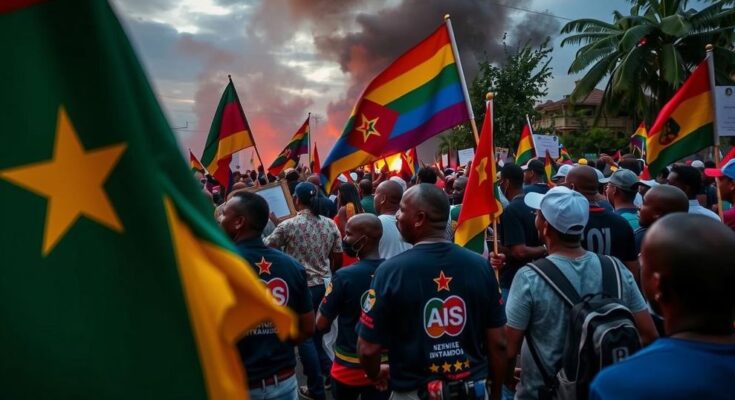After Mozambique’s elections confirming Frelimo’s dominance, protests erupted leading to violent clashes resulting in the deaths of at least 11 individuals, including Silvio Jeremias. Allegations of electoral fraud have been vehemently claimed by the opposition, while police assert their actions were merely defensive. Calls for accountability are growing stronger against a backdrop of economic hardship and widespread discontent among younger citizens.
In the wake of Mozambique’s recent elections, violent protests erupted following the announcement of results that confirmed the ruling Frelimo party’s continued leadership. On October 25, Silvio Jeremias, a petrol station worker, was fatally shot while attending a demonstration against the election outcome in Maputo. The official reports indicated that Frelimo’s presidential candidate, Daniel Chapo, garnered 70.7% of the votes, while allegations of electoral fraud have surfaced. The protests, which were widespread across the nation, resulted in at least 11 fatalities according to Human Rights Watch, along with numerous injuries from gunfire. Police maintain that their use of live ammunition was limited to warning shots, contending that any fatalities were accidents caused by stray bullets during skirmishes involving opposition party supporters attempting to seize weapons from police. Mozambique’s socio-economic context is critical; the nation ranks among the poorest globally, possessing a majority youthful demographic disenchanted with the long-standing Frelimo regime. The opposition party Podemos, led by Venâncio Mondlane, has claimed significant electoral support, asserting that they received 53% of the vote. However, official sources dispute this and affirm that Frelimo increased its parliamentary representation. Legal actions are being initiated by Podemos, whereby they have submitted extensive documentation contesting the election results. Concerns over electoral integrity have further escalated with accusations of inflated voter rolls, ballot manipulation, and violence against political actors. Recent incidents involving the assassination of opposition members prior to the election have intensified fears regarding political repression. The pattern of violence attributed to State officers against dissenters has gained widespread condemnation, creating an urgent demand for accountability and reform. As communities mourn their losses, citizens are increasingly vocal about their desire for transparent governance and accountability. The tragic loss of Jeremias is emblematic of broader societal frustrations, with demands for justice and reform resonating strongly among mourners at his funeral, who proclaimed their wish for a democratic future.
Mozambique has been under the governance of the Frelimo party since its independence in 1975, experiencing political stability alongside economic challenges. The recent elections, marred by allegations of misconduct, have catalyzed public dissatisfaction, particularly among the youth who comprise a significant portion of the population. Protest movements have amplified in response to perceived injustices in the electoral process, revealing deeper concerns about governance and political rights in the country. Allegations of violence targeted at opposition figures have raised alarms regarding human rights conditions, prompting civil society to advocate for greater accountability and electoral integrity.
The escalating violence and loss of life following Mozambique’s election results highlight a critical juncture for the nation amid claims of electoral fraud and police brutality. With a significant portion of the population actively opposing the extant governance structure, it is imperative that the judicial system addresses the grievances surrounding electoral legitimacy and human rights violations. Calls for justice in the wake of tragic losses symbolize a collective yearning for a more democratic and accountable political system in Mozambique.
Original Source: www.theguardian.com




